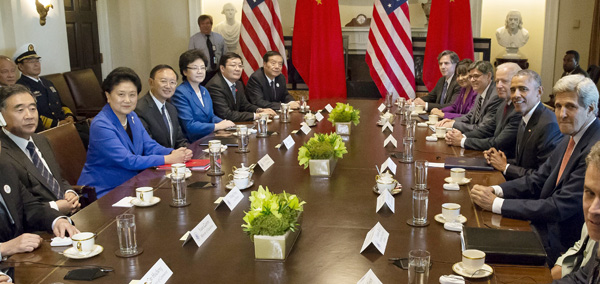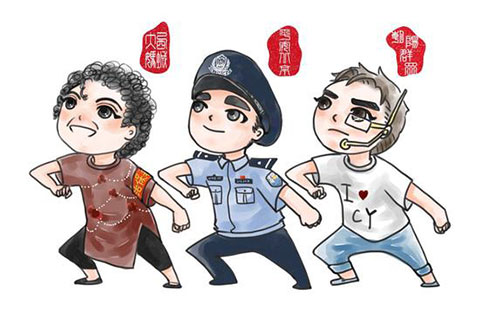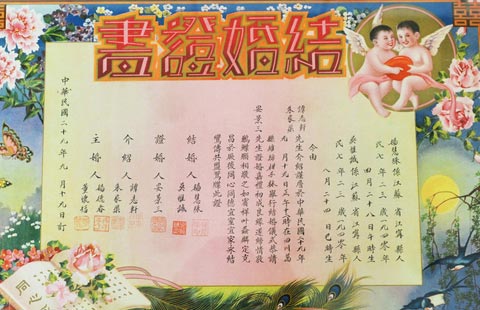Thucydides Trap not etched in stone
Updated: 2015-08-20 07:31
(China Daily)
|
|||||||||
 |
|
Strategic and Economic Dialogue principals, including Vice-Premier Wang Yang (first left), Vice-Premier Liu Yandong (second left) and State Councilor Yang Jiechi (third left), meet with US President Barack Obama and members of his Cabinet in the Cabinet Room at the White House in Washington on Wednesday. [Photo/Agencies] |
Editor's Note: Graham T. Allison, political scientist and professor at the Kennedy School of Government at Harvard, has written two articles - in Financial Times in August 2012 and The New York Times in July 2013 - cautioning China and the United States not to fall into the Thucydides Trap, where a rising power causes fear in an established power which leads to a war. As tensions between China and the US escalate on trade and regional issues, the term Thucydides Trap is being widely used. Following are the views of three international relations scholars through thepaper.cn on the subject.
Chinese idiom can promote ties
If China as a rising power is seen as the fundamental cause of a potential war with an established power, that is, the US, it will be blamed for the worsening bilateral ties. While the US can always say its China policy is based on normal security concerns, China will have to shoulder the entire responsibility of improving bilateral relations. The Thucydides Trap has become a catchword for many commentators because they want to put China in a disadvantageous position and allow the US to occupy the historical and moral high ground.
The term is a dangerous diplomatic trap for emerging powers. More importantly, the Thucydides Trap is in direct conflict with the "new type of major-power relationship" that China and the US agreed in 2012 to avoid repeating the mistakes of the past world powers.
Although China and the US are not likely to go to war against each other in the near future, by harping on the Thucydides Trap, some commentators are trying to hijack the Sino-US ties. As such, Chinese scholars should avoid using the term in the context of Sino-US ties. Instead, they should find a concept or theory from China's long history to describe future Sino-US relations while laying emphasis on the new type of major-power relationship.
Perhaps they could use "Xuncius Breakthrough" in the context of Sino-US ties.
British philosopher Thomas Hobbes' theory - under the natural state, every person is the other person's enemy, and war is a normal state - has influenced Western political thought for centuries. But Chinese philosopher Xuncius (313-238 BC) said a set of well-planned manners or actions, as opposed to selfish designs, can help avoid conflicts and facilitate cooperation. Hence, Xuncius's theory can lead China and the US toward sustainable cooperation.
Zhang Feng is a researcher in international relations at Australian National University.

 Stars in their eyes: leaders in love
Stars in their eyes: leaders in love
 A survival guide for singles on Chinese Valentine’s Day
A survival guide for singles on Chinese Valentine’s Day
 Beijing police publishes cartoon images of residents who tip off police
Beijing police publishes cartoon images of residents who tip off police
 Rare brown panda grows up in NW China
Rare brown panda grows up in NW China
 Putin rides to bottom of Black Sea
Putin rides to bottom of Black Sea
 The changing looks of Beijing before V Day parade
The changing looks of Beijing before V Day parade
 Nanjing displays ancient marriage, divorce certificates
Nanjing displays ancient marriage, divorce certificates
 Top 10 Android app stores in China
Top 10 Android app stores in China
Most Viewed
Editor's Picks

|

|

|

|

|

|
Today's Top News
Chemical plants to be relocated in blast zone
Asian sprinters on track to make some big strides
Jon Bon Jovi sings in Mandarin for Chinese Valentine's Day
Tsipras formally resigns, requesting snap general elections
DPRK deploys more fire units to frontlines with ROK
Giant panda Mei Xiang at US zoo expected to give birth soon
S Korean president to participate in China's war anniversary
Thucydides Trap not relevant to today's Sino-US ties: Opinion
US Weekly

|

|







